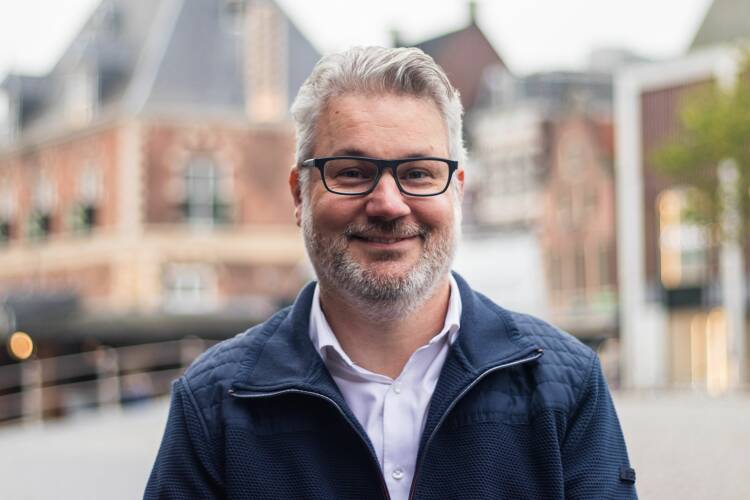


READING TIME: 3 MINUTES


PHOTO: MAARTEN ALEMAN
PROPOSITION
José Alves Castela Cardoso Forte – Medical Sciences
‘Success is stumbling from failure to failure with no loss of enthusiasm’ (Winston Churchill)
TEXT: KIRSTEN OTTEN
How much do we use our imagination? Well, we use it a whole lot and we use it all day long. During the Alumni Day on 25 May, professor of cognitive neuropsychiatry André Aleman gives his listeners a glimpse of how this function of the brain works in his lecture The Power of Mental Imagination.
He gives us a sneak peak in his office at the UMCG.
You guessed it right
‘Do you see that black piece of plastic sticking out over that book over there? I'm pretty sure that's the top of a stapler without having seen the thing in its entirety.’ As it turns out, he had correctly guessed the object, and Aleman explains that in such a case, we use our prior knowledge of what we expect in a particular environment: ‘As a result, my brain turns that small component into a whole object, makes a mental image of it.’
It is just one of the many examples André Aleman can provide to show how we use mental imagination to quickly interpret the world around us and to anticipate situations. And why does it matter? ‘The information we receive is often very sparse, and yet we usually know perfectly well what is in front of us. As a result, we can walk down the street in a familiar city, almost without a thought, and still arrive at the right destination. And that is also why the very first day spent in another country, where many things are different, is so tremendously tiring. It requires much more processing power, whereas it is considerably easier to use knowledge from your own brain.’
When your brain spins out of control
When that information from the ‘inside’ does not let itself be corrected enough by the outside world and your imagination takes over, things can go wrong in your brain. In such cases, you may suffer from hallucinations and delusions, as is the case with schizophrenia. ‘Because something is wrong in the brain regions used to recognize and tell sources apart, these people attribute their inner speech to an external source.’ But even in healthy people, the brain can spin out of control: ‘A well-known example is that of new parents who think they hear their baby crying when it is sleeping peacefully. In that case, your system is, unconsciously but actively, scanning sounds, and you sometimes cross a threshold and hear things that are not there.'
Imagination to score
What you imagine can therefore be experienced as life-like. And that is precisely why imagination can also be used as a form of therapy. ‘In sports, this method has been used for some time: athletes who visualize a successful performance before a match often get a better score than people who do not. Mental imagination can therefore have an activating effect on motor skills, for example.
We now know that a much broader group benefits from imagining positive experiences. People with memory problems, for instance. They have an increased risk of apathy and consequently undertake increasingly fewer activities, causing the brain to deteriorate even faster. By training them to imagine positive experiences, we see this process slowing down. But in reality, everyone can benefit from mental imagination, provided your expectations are realistic.’



READING TIME: 3 MINUTES

of Mental Imagination

PROPOSITION
José Alves Castela Cardoso Forte –
Medical Sciences
‘Success is stumbling from failure to failure with no loss of enthusiasm’ (Winston Churchill)
You guessed it right
‘Do you see that black piece of plastic sticking out over that book over there? I’m pretty sure that's the top of a stapler without having seen the thing in its entirety.’ As it turns out, he had correctly guessed the object, and Aleman explains that in such a case, we use our prior knowledge of what we expect in a particular environment: ‘As a result, my brain turns that small component into a whole object, makes a mental image of it.’
It is just one of the many examples André Aleman can provide to show how we use mental imagination to quickly interpret the world around us and to anticipate situations. And why does it matter? ‘The information we receive is often very sparse, and yet we usually know perfectly well what is in front of us. As a result, we can walk down the street in a familiar city, almost without a thought, and still arrive at the right destination. And that is also why the very first day spent in another country, where many things are different, is so tremendously tiring. It requires much more processing power, whereas it is considerably easier to use knowledge from your own brain.’
When your brain spins out of control
When that information from the ‘inside’ does not let itself be corrected enough by the outside world and your imagination takes over, things can go wrong in your brain. In such cases, you may suffer from hallucinations and delusions, as is the case with schizophrenia. ‘Because something is wrong in the brain regions used to recognize and tell sources apart, these people attribute their inner speech to an external source.’ But even in healthy people, the brain can spin out of control: ‘A well-known example is that of new parents who think they hear their baby crying when it is sleeping peacefully. In that case, your system is, unconsciously but actively, scanning sounds, and you sometimes cross a threshold and hear things that are not there.'
Imagination to score
What you imagine can therefore be experienced as life-like. And that is precisely why imagination can also be used as a form of therapy. ‘In sports, this method has been used for some time: athletes who visualize a successful performance before a match often get a better score than people who do not. Mental imagination can therefore have an activating effect on motor skills, for example.
We now know that a much broader group benefits from imagining positive experiences. People with memory problems, for instance. They have an increased risk of apathy and consequently undertake increasingly fewer activities, causing the brain to deteriorate even faster. By training them to imagine positive experiences, we see this process slowing down. But in reality, everyone can benefit from mental imagination, provided your expectations are realistic.’
How much do we use our imagination? Well, we use it a whole lot and we use it all day long. During the Alumni Day on 25 May, professor of cognitive neuropsychiatry André Aleman gives his listeners a glimpse of how this function of the brain works in his lecture The Power of Mental Imagination. He gives us a sneak peak in his office at the UMCG.
PHOTO: MAARTEN ALEMAN

TEXT: KIRSTEN OTTEN